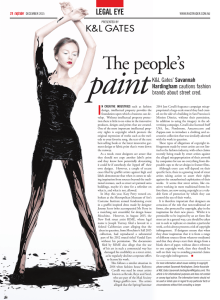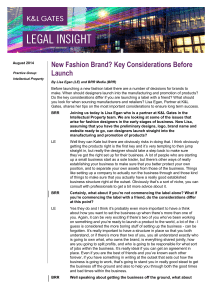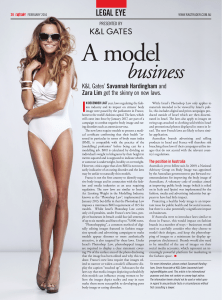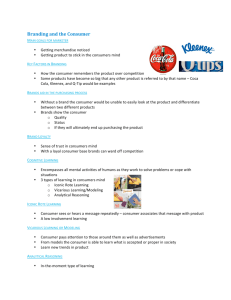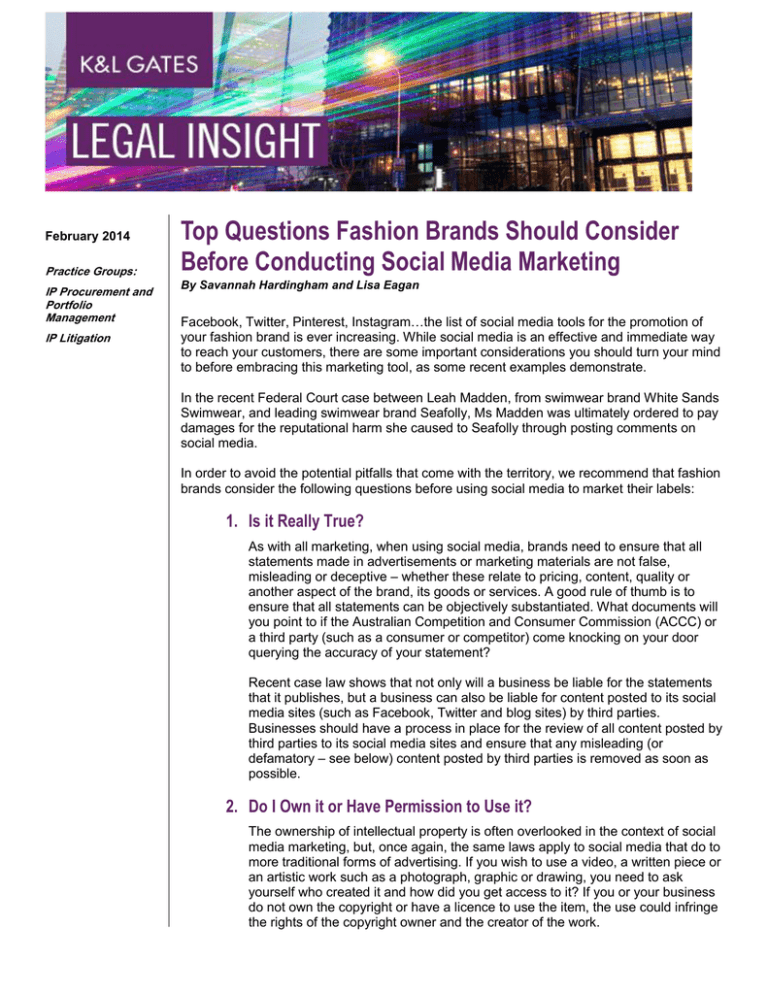
February 2014
Practice Groups:
IP Procurement and
Portfolio
Management
IP Litigation
Top Questions Fashion Brands Should Consider
Before Conducting Social Media Marketing
By Savannah Hardingham and Lisa Eagan
Facebook, Twitter, Pinterest, Instagram…the list of social media tools for the promotion of
your fashion brand is ever increasing. While social media is an effective and immediate way
to reach your customers, there are some important considerations you should turn your mind
to before embracing this marketing tool, as some recent examples demonstrate.
In the recent Federal Court case between Leah Madden, from swimwear brand White Sands
Swimwear, and leading swimwear brand Seafolly, Ms Madden was ultimately ordered to pay
damages for the reputational harm she caused to Seafolly through posting comments on
social media.
In order to avoid the potential pitfalls that come with the territory, we recommend that fashion
brands consider the following questions before using social media to market their labels:
1. Is it Really True?
As with all marketing, when using social media, brands need to ensure that all
statements made in advertisements or marketing materials are not false,
misleading or deceptive – whether these relate to pricing, content, quality or
another aspect of the brand, its goods or services. A good rule of thumb is to
ensure that all statements can be objectively substantiated. What documents will
you point to if the Australian Competition and Consumer Commission (ACCC) or
a third party (such as a consumer or competitor) come knocking on your door
querying the accuracy of your statement?
Recent case law shows that not only will a business be liable for the statements
that it publishes, but a business can also be liable for content posted to its social
media sites (such as Facebook, Twitter and blog sites) by third parties.
Businesses should have a process in place for the review of all content posted by
third parties to its social media sites and ensure that any misleading (or
defamatory – see below) content posted by third parties is removed as soon as
possible.
2. Do I Own it or Have Permission to Use it?
The ownership of intellectual property is often overlooked in the context of social
media marketing, but, once again, the same laws apply to social media that do to
more traditional forms of advertising. If you wish to use a video, a written piece or
an artistic work such as a photograph, graphic or drawing, you need to ask
yourself who created it and how did you get access to it? If you or your business
do not own the copyright or have a licence to use the item, the use could infringe
the rights of the copyright owner and the creator of the work.
Top Questions Fashion Brands Should Consider Before Conducting Social
Media Marketing
This approach also applies to trade marks owned by other businesses. You must
not use another's trade mark in respect of your business' products or services,
including in a way that would be likely to confuse consumers as to the origin of
such products or services. However, comparative advertising, when done
appropriately, is one way you can refer to another's trade mark without the
likelihood of confusion. If in doubt, seek legal advice!
3. Does it Hurt Someone Else's Reputation?
If you publish or authorise the communication of content that injures the
reputation of a person without good reason, you could be liable for defamation.
Defamation is a complex area of law but a good starting point is to carefully
consider whether publishing a post or other material (including a link to a third
party publication) might damage the reputation of someone else. As noted
above, put in place a process for the review of all content posted by third parties
to your social media sites to ensure that any potentially defamatory content is
removed swiftly.
Make the most of promoting your brand through social media, and the benefits that come
with such an immediate form of promotion and marketing, but think about how to best
achieve these aims with the above considerations in mind.
K&L Gates can assist companies manage the legal risks of their social media marketing. For
more information please contact Savannah Hardingham, Senior Associate, Intellectual
Property (savannah.hardingham@klgates.com) or Lisa Egan, Partner, Intellectual Property
(lisa.egan@klgates.com).
Author:
Savannah Hardingham
savannah.hardingham@klgates.com
+61.3.9205.2043
Contact:
Lisa Egan
lisa.egan@klgates.com
+61.3.9205.2099
2
Top Questions Fashion Brands Should Consider Before Conducting Social
Media Marketing
Anchorage Austin Beijing Berlin Boston Brisbane Brussels Charleston Charlotte Chicago Dallas Doha Dubai Fort Worth Frankfurt
Harrisburg Hong Kong Houston London Los Angeles Melbourne Miami Milan Moscow Newark New York Orange County Palo Alto Paris
Perth Pittsburgh Portland Raleigh Research Triangle Park San Diego San Francisco São Paulo Seattle Seoul Shanghai Singapore Spokane
Sydney Taipei Tokyo Warsaw Washington, D.C. Wilmington
K&L Gates practices out of 48 fully integrated offices located in the United States, Asia, Australia, Europe, the
Middle East and South America and represents leading global corporations, growth and middle-market companies,
capital markets participants and entrepreneurs in every major industry group as well as public sector entities,
educational institutions, philanthropic organizations and individuals. For more information about K&L Gates or its
locations, practices and registrations, visit www.klgates.com.
This publication is for informational purposes and does not contain or convey legal advice. The information herein should not be used or relied upon in
regard to any particular facts or circumstances without first consulting a lawyer.
©2014 K&L Gates LLP. All Rights Reserved.
3

